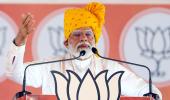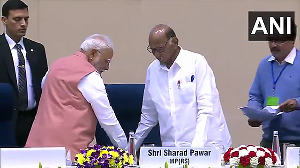This time Modi has no emotive message to take to the stump.
Muscular nationalism doesn't work against the backdrop of China's successive inroads into Indian territory.
Rising prices is a sore point that cuts across class and caste barriers; unprecedented levels of unemployment has the youth in a ferment.
This has reduced the BJP campaign to a laundry list of recycled grievances and thinly veiled communal appeals, neither of which are working as well as they have in the past, argues Prem Panicker.

You can, with precision, name the date on which the Bharatiya Janata Party lost control of the narrative.
This election campaign was supposed to be about Vision 2047. About a 'Viksit Bharat' that was coming.
What you have seen till date is just the trailer, the real work will begin in the third term, Modi said.
It all boiled down to one trope: A BJP hat-trick was inevitable; we just needed to go through the formalities.
There were no details about what that Vision 2047 was or what a 'Viksit Bharat' would look like, or how we would get to that golden age from where we are today -- but when framing narratives of hope, details hardly matter.
Say it with sufficient conviction and people will buy it -- that, after all, is the modus operandi of the snake oil salesman.
But then, on March 10, 2024, the BJP's motormouth MP from Karnataka Anantkumar Hegde said that the party's slogan of 'Ab ki baar char sau paar' was vital, as the BJP needed a two-thirds majority to rewrite the Constitution.
Within hours the BJP, aware of the damage Hegde's ill-timed utterance could create, fielded its spokesperson Gaurav Bhatia to distance the party from Hegde's views, and to dismiss it as the MP's 'personal view'. The party, Bhatia said, has asked Hegde to clarify.
Bhatia's attempt to slam the stable door shut was too late, though -- the horse had already bolted. And then it got worse.
Within a week Arun Govil, the BJP's candidate in Meerut. and Lallu Singh, sitting MP of Faizabad, echoed Hegde's words.
Singh, risibly, tried to walk it back and said it was a 'slip of the tongue'. But three BJP leaders saying the same thing in quick succession solidified the growing suspicion that this was indeed the BJP's plan.
The question was, what would a rewrite look like? Initial speculation was that the idea was to change the 'secular' nature of the country, to Constitutionally convert the country into a theocracy. But then the Opposition exhumed a statement by RSS chief Mohan Bhagwat dating back to September 2015, and another by RSS ideologue Manmohan Vaidya from January 2017, wherein they had argued against reservations.
With that, the narrative was set in stone: The RSS wants to end reservations; the BJP is its political arm; if the BJP wins a third term the Constitution will be rewritten and reservations done away with.
The party's denials didn't work -- three party leaders spouting the same line was three too many to be wished away or 'distanced from'.
The party hastily dropped 'char sau paar' from its sloganeering cheat sheet and from its posters, but it might as well have tried to unring a bell. Dalits and other backward classes took fright en masse.
As recently as April 22, a conclave of over four dozen Dalit Ambedkarite groups declared that the election was a fight to save the Constitution, and pledged support to the Maha Vikas Aghadi in Maharashtra. Similar statements have been made by Dalit groups elsewhere in the country.

Modi's belated attempt to frame the election as a means to 'punish those who are against the Constitution' was too little, too late, too weak.
He then shifted to 'Even Ambedkar cannot change the Constitution now' -- a line that would take top honours in any ranking of the Ten Most Inane Lines of All Time, considering that the guiding spirit of the Constitution has been dead these past 68 years.
Karnataka Chief Minister Siddaramaiah was quick to take Modi behind the woodshed and to superglue him inextricably (external link) to the RSS line of thinking.
That was the moment 'Viksit Bharat' joined a long line of BJP bumper stickers, beginning with 'Achche Din', in the discard heap.
Since then, the BJP has been a party in search of a counter narrative that can stick. And nothing demonstrates that desperation as clearly as the recent Modi-helmed kerfuffle over the 'inheritance tax'.
When Sam Pitroda -- a has-been in Congress inner circles for a long time now -- brought up the subject in course of a chat on television, the BJP seized on it as a promising stick to beat the Congress with.
'They are coming for your wealth', was the tenor of Modi's speeches on the day Pitroda's off- hand remark was picked up by the media.
'They will take away even your mangalsutra and give it to guspetiyas...' 'The Congress wants to pry into women's lockers...'
How effective Modi thinks this message will be when addressing desperately poor audiences in the heartland is unclear.
What is clear, though, is that it proved to be an epic own goal -- before the day was out, the Internet was awash with videos, newspaper clippings and past tweets from a bevy of the party faithful, all talking up the possibilities that inhere in the imposition of an inheritance tax.
Then finance minister Arun Jaitley, then minister of state for finance Jayant Sinha, Swarajya's editorial director R Jagannathan, IT Cell chief Amit Malviya and sundry other BJP leaders and fellow travelers found their past utterances in favor of an inheritance tax exhumed and recirculated, much to the party's collective embarrassment.
Worse, it was pointed out that far from the Congress wanting to impose such a tax, it was then prime minister Rajiv Gandhi's government that had abolished the tax in the first place.
So Modi -- who has the ability to change rhetorical tack on a dime -- tried to make the best of a bad situation by alleging that Rajiv Gandhi had revoked the law only to ensure that half his slain mother's wealth did not go to the government.
Again, that proved to be a misstep: The Congress pulled out the 1985 Budget speech by then finance minister V P Singh wherein it is clearly stated that the abolition of inheritance tax was effective only from March 16, 1985.
Indira Gandhi was assassinated on October 31, 1984 -- there was no way Rajiv Gandhi could have benefited from the revocation of the tax, since the law had no retrospective effect.
The sense that the ruling party was flailing around in search of a cohesive narrative showed up as recently as April 25 when, addressing a rally in Morena in Madhya Pradesh, Modi threw everything and the kitchen sink at the audience:
- The Congress will snatch more than half of the earnings of people through inheritance tax (earnings, note, not inherited wealth)
- Congress wants to confiscate people's jewelry and small savings by 'conducting an X-ray' of their properties and valuables.
- Modi is a wall standing between you and the Congress' plan to loot you.
- The Congress wants to snatch reservations of SCs/STs/OBCs for the sake of the Muslim vote bank.
- The Congress says Muslims have first right on the country's resources.

Never mind that all those talking points were either outright lies or distortions.
Morena is a predominantly agrarian district with an estimated 45% of its population (external link) below the poverty line -- what those people made of all this talk of jewelry and valuables is anyone's guess.
But to paraphrase a trope, Modi ne bola hai toh kuch sochkar hi bola hoga...
SERIOUS though the char sau paar faux pas is, the real problems for Modi and the BJP lie elsewhere.
Sometime between the first and second phases of Covid, Kerala's Pinnarayi Vijayan and Tamil Nadu's M K Stalin had a series of conversations that revolved around one central idea:
Modi, they figured, is at his best when he is able to turn an election campaign into a mano-a-mano cage fight pitting himself against one Opposition leader -- preferably Rahul Gandhi, on whom the right-wing ecosystem has expended considerable effort and money to brand him a 'pappu', a lightweight.
Conversely, they figured, Modi was lost when he was forced to fight regional leaders on localised issues, about which he is largely clueless.
The idea slowly spread. Maharashtra's Uddhav Thackeray bought into it; Aditya Thackeray was dispatched as emissary to proselytise the thought with the likes of Bihar's Nitish Kumar and Lalu Yadav, Uttar Pradesh's Akhilesh Yadav and West Bengal's Mamata Banerjee.
The seeds of Opposition unity were sown -- and the core concept was that a unified Opposition would not anoint any one leader for Modi to target.
It hasn't gone entirely according to plan. Vijayan, one of the original proponents of the idea of unity, succumbed to the political compulsions in his home state, where the BJP is a negligible factor and the Congress-led UDF is his main threat.
Mamata Banerjee figured that in West Bengal the Congress is a non-entity, not worth wasting even a handful of seats on, and decided to go it alone. Nitish Kumar had one of his periodic attacks of conscience.
Off-setting these, though, were the pluses. It was touch and go for a while, but the Congress swallowed its outsize ego and accepted the role of junior partner in Uttar Pradesh, in Bihar, and in Tamil Nadu.
Congress President Mallikarjun Kharge, with an assist from the Gandhi siblings, sorted out Rajasthan, moved Ashok Gehlot off centre-stage and gave the younger, more dynamic Sachin Pilot the reins.
Similarly in Karnataka, the high command was willing to take a step back and let Siddaramaiah and, more importantly, D K Shivkumar, run the table while Revanth Reddy was given a similar role in neighbouring Telangana.

An array of regional leaders was now fronting the fight, exactly as originally envisaged, and this amounted to a monumental headache for the BJP.
In 2019, an extended multi-phase election was a 'masterstroke', allowing Modi to take his message of muscular nationalism across the country in a series of focused campaigns, phase by phase while a disunited Opposition was largely missing from the fray.
This time round, that same 'masterstroke', which saw a tame Election Commission split the polls in seven phases over 44 days, has become a millstone around the ruling party's neck, for two reasons.
The first, and most important, is that this time Modi has no similarly emotive, overarching message to take to the stump.
Muscular nationalism doesn't work against the backdrop of China's successive inroads into Indian territory -- as I write this, news is that China is building roads in the Pakistan occupied Kashmir region near the Siachen glacier.
There is nothing to write home about in the employment situation; rising prices is a sore point that cuts across class and caste barriers; unprecedented levels of unemployment has the youth in a ferment, and around the country farmers, Rajputs, Kshatriyas, Dalits and other interest groups are up in arms.
This has reduced the BJP campaign to a laundry list of recycled grievances and thinly veiled communal appeals, neither of which are working as well as they have in the past.
The second, and equally significant, problem is that while the BJP has a list of star campaigners, there is in effect only one-and-a-half -- Modi, and Amit Shah (who, most recently, came up with the bizarre line that the Congress wants to introduce Sharia law throughout the country -- a hard sell even for the most committed of hardcore Hindutva adherents). The other 'stars', with the exception of UP Chief Minister Adityanath in his home state and in adjoining territories, are proving to be damp squibs.
The BJP campaign, thus, depends almost entirely on Modi -- who, for all his wholehearted commitment and vigour, can only do so much.
On the same day that Modi does two rallies and one roadshow, Tejaswi Yadav is doing as much in Bihar and surrounds; Akhilesh Yadav in UP and neighbouring states; the Thackerays and Pawar in Maharashtra; Siddaramaiah and DKS in Karnataka overlapping into Telangana while Revanth Reddy focusses on the latter state and occasionally crosses into Karnataka...
The Opposition campaign is no longer dependent on the two Gandhis. Combine this with the fact that this extended campaign is providing legroom for the combined Opposition to mount the sort of targeted campaigns the BJP was famed for, and the problems for the ruling party become magnified.
As on date Modi is, quite literally, being outnumbered and out-rallied. His response has been to increasingly single out the Congress for his ire -- but that merely gives the other Opposition leaders cloud cover to carry out their attacks.
For a party that has jettisoned its 370+ ambitions and is now desperately fighting to securing a simple majority, the first two phases of the elections provide little joy -- the south has remained shut tight, and every sign points to a slow bleed of seats in the north.
If the BJP loses 32 of the seats it now holds, it falls below that Plimsoll line, and that is the calculation that is inducing a measure of fear within the party hierarchy.
Time is running out; something has got to give. The question is, what? The answer is -- we don't know, but it is almost certain that in an already roiled atmosphere, whatever the ruling party now comes up with will be, to put it mildly, unpalatable.
Feature Presentation: Rajesh Alva/Rediff.com











 © 2025
© 2025